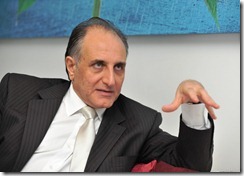Speaking at an event in Dubai recently, mobile network operator CEOs discussed their companies’ experiences with mobile broadband deployments, and while many opportunities have been created through the emergence of the technology, others have been lost as well
Dowidar acknowledges that as the mobile broadband proposition began gaining ground, Vodafone Egypt could have worked harder on offering differentiated services and segmenting its customer base further
Hatem Dowidar, CEO of Vodafone Egypt, is in little doubt that this is the stage of industry development in which mobile network operators ought to be sharing more network elements.
“In Egypt there is a growing amount of sharing, including of rooftops, antennas, and joint maintenance.” Dowidar said. “Tower sharing is a more efficient model when an operator is in the build-out phase of its network, though in Egypt we have reached the stage of talking about sharing backbone and better leveraging fibre.”
It was at the end of 2011 when Mobiserve Holding, a solutions provider for telecommunication infrastructure engineering services in the Middle East and Africa, announced the signing of a cellular network tower sharing agreement with Egyptian telecom regulator, National Telecommunications Regulatory Authority (NTRA), enabling telecom operators in Egypt to share network infrastructure.
The concession conferred on Mobiserve the ability to build its own cellular network sites in Egypt and rent them to telecom operators.
In an interview with Towerxchange, Magdy Zaky, commercial manager of Alan Dick & Company North Africa, said the three mobile operators in Egypt have become conservative about investing capex, with a considerable reduction in greenfield site rollout, and a preference to deploy rooftops, which can cost a third of the price of a new greenfield site.
“Higher bandwidths and higher spectrum frequencies both tend to drive additional cell sites, which is expensive,” Zaky said. “This has driven passive infrastructure sharing, which the operators have chosen to do on a bi-lateral, one-for-one basis, rather than build their own dedicated and standalone sites. Today, maybe 20-25 per cent of the new greenfield sites are shared and coverage of newly constructed roads is shared also, which saves at least 50 per cent of passive infrastructure costs.”
With the licensing of the likes of Mobiserve, the first phase of the introduction of a towerco model in Egypt was established. Zaky believes the second stage is the lease of the existing passive infrastructure network, which requires the involvement of the big African towerco investors who have the know-how and previous experience in undertaking such.
“The Egyptian operators tend to be quite conservative and very precious about their existing infrastructure, and I do not think it is likely that they will make a deal – for their existing network – with a local contractor to be their exclusive towerco,” Zaky said.
In the United Arab Emirates, Etisalat and Du currently share certain mobile network sites, but efforts to implement network sharing for fixed line services, which could see the rival companies each offer broadband and television services across the country, has yet to be implemented despite direction from the national regulator to do so.
At the moment consumers can only purchase services from one of the operators, depending upon where they live in the UAE, though Du’s CEO Osman Sultan says his company continues to look to drive efficiencies wherever possible in other areas of the business.
“We are advocating much more sharing of infrastructure. Sharing of sites alone is not enough,” Sultan said. “As an organisation, we are actively engaged in the outsourcing model as related to the management and roll out of the network and IP infrastructure.”
At the beginning of this year, for example, Du announced a partnership agreement with Alcatel-Lucent to deploy IP-routing technology to achieve convergence in its telecom services.
Du’s Sultan believes his company could have done more with respect to capitalising on the social media opportunity. However, he is convinced that a single operator cannot be successful in this area in isolation
Under the terms of the agreement, Alcatel-Lucent started deploying an IP/MPLS, as well as providing Du with a set of comprehensive professional services that include project management, network design, installation and commissioning, software integration and operations.
This agreement followed a deal penned with Ericsson, with the technology provider being signed up to a five-year IT management contract. As part of the managed services agreement, Ericsson was made responsible for augmenting Du’s IT applications and delivering development and maintenance for the UAE telco’s IT applications.
Under the terms of the contract, Ericsson agreed to develop and maintain applications for approximately 35 platforms and technologies, including upgrading and consolidation of Du’s software applications domains, transformation of operations and enterprise support systems, and managed services.
Vodafone Egypt’s Dowidar also spoke to how competition has resulted in the commoditisation of telecom services in Egypt, and very aggressive pricing across products and services has resulted in operators seeking larger differentiation alternatives.
“In 2009 there were a total of 209 controlled shops operated by the country’s three mobile network operators combined.” Dowidar said. “Today Vodafone operates 250 on its own.”
The Egyptian mobile incumbents have the prospect of even more competition in the market looming future as it has been reported that the NTRA is to set the final price for the country’s fourth mobile licence by the second half of this year.
Amr Badawi, CEO of the NTRA confirmed that the licence is being allocated automatically to Telecom Egypt as part of a wide-ranging review that will see the incumbent mobile networks permitted to resell landline services provided by the state-owned telco.
The fate of Telecom Egypt’s 45 per cent stake in Vodafone Egypt is still being debated. There have been concerns that a sale could affect the landline monopoly’s profits, which are heavily dependent on its Vodafone shares.
Dowidar also acknowledged that as the mobile broadband proposition began gaining ground Vodafone could have worked harder on offering differentiated services and segmenting its customer base further.
The operator has since undertaken a programme to focus on customer experience; improving its retail store design amongst other things. Vodafone has also introduced simpler tariff plans and is looking to drive innovation with respect to services to be provided to small and medium size businesses (SMEs).
“We are aiming to make SMEs more effective in their business operations, and to utilise tools such as cloud computing to achieve this,” Dowidar said.
Dowidar also spoke to the Vodafone Ventures initiative, which is the strategic corporate venture capital arm of Vodafone Group and is led out of the Vodafone xone office. Vodafone xone is a state-of-the-art incubation centre for ground-breaking technology solutions. Vodafone xone is dedicated to partnering with start-up companies, entrepreneurs and venture capital firms in Silicon Valley and beyond.
Launched in September 2011 in Silicon Valley, Vodafone xone offers start-ups onsite ventures, development and integration support. A subsequent office was opened in Egypt and Vodafone’s investments, made in conjunction with top-tier venture capital firms, focus on the following areas: Consumer, enterprise, infrastructure and devices. Vodafone’s current portfolio consists of companies such as ItsOn, CellEra, Caringo, Perfecto Mobile, Pontis, Finsphere, VoucherCloud and LocalResponse.
Du’s Sultan believes his company could have done more with respect to capitalising on the social media opportunity. However, he is convinced that a single operator cannot be successful in this area in isolation and this is part of the reason why he believes a cooperative approach would stand the greatest chance of success, and has been championing the proposition of an operator alliance.
The proposed alliance would allow a digital platform to reach far more users, providing the scale that would allow it to compete effectively. The majority of over-the-top (OTT) services and social networks generate network traffic but not so much operator revenue, with Sultan noting: "Network traffic doubles every eight to nine months, but revenue is heading to a plateau, so we need to claim part of the new revenues alongside OTT players."
Sultan has gone on record in the past stating that he does not believe it is practical for individual operators in a given market to build their own app stores, despite the allure of generating incremental revenue through the sale of such applications. Sultan said the industry was still looking to figure out the most effective way for new applications to be purchased and used over mobile channels, with network operators gaining a reasonable share of the revenues.
“Vodafone live!, Orange World and Vodafone 360 are examples of operators trying to develop their own app stores, and I don’t think they have been so successful,” Sultan said. “Social networking is what made data communications successful, and I believe aggregation is what is needed in the Arab world where a partnership between OTT players and mobile operators is established,” he added.





0 comments ↓
There are no comments yet...Kick things off by filling out the form below.
Leave a Comment